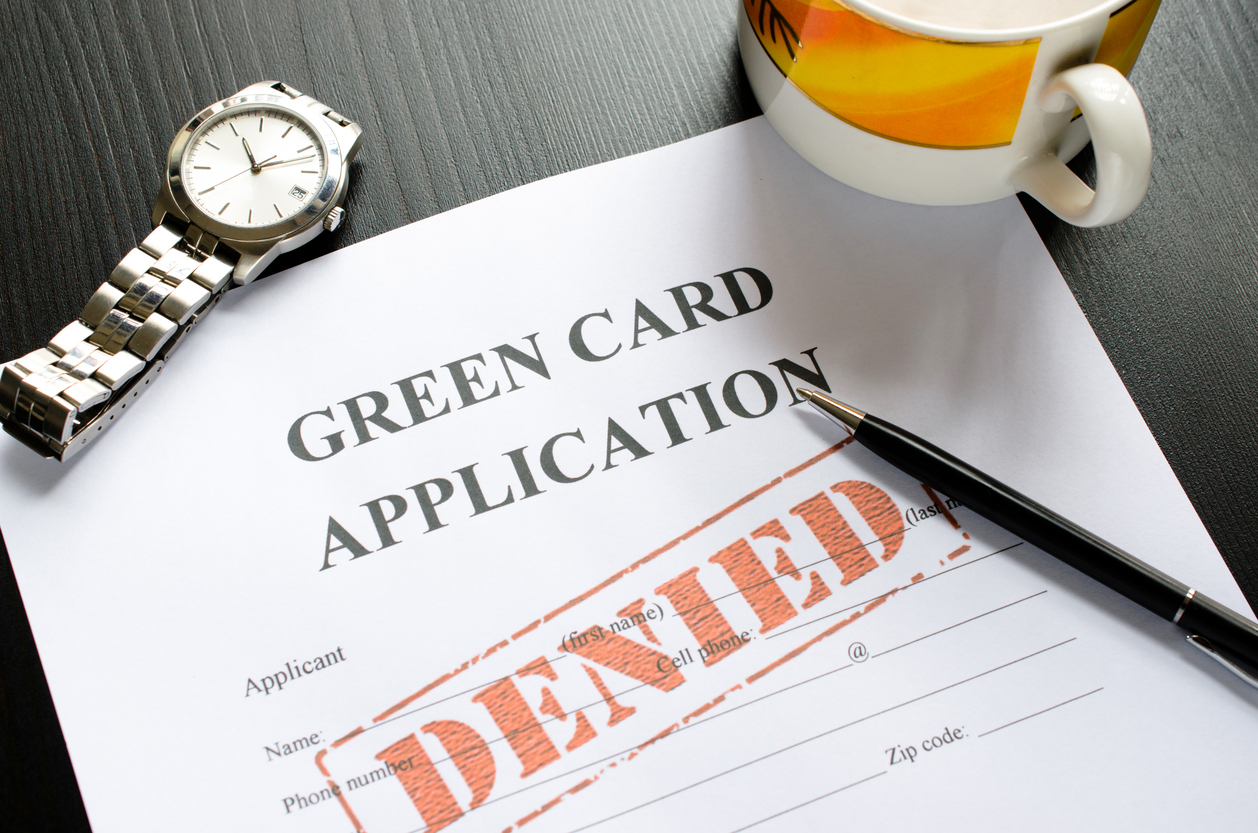Your Legal Options if Your Green Card Application is Denied
Applying for a green card is an important phase for many individuals seeking to live and work in the United States. The process can be complex, with various eligibility requirements and documentation needed to successfully obtain this coveted legal status.
Whether you’re applying through family sponsorship, employment-based categories, or other avenues, understanding the intricacies of the green card application process is crucial to ensuring a smooth and successful outcome.
The green card application process typically involves submitting a series of forms, providing supporting documents, and attending an in-person interview with U.S. Citizenship and Immigration Services (USCIS). During this process, USCIS evaluates your eligibility, verifies the information provided, and ultimately decides whether to grant or deny your green card application.
Common Reasons for Green Card Application Rejection
Unfortunately, not all green card applications are approved, and applicants may face rejection for a variety of reasons. Some of the most common reasons for green card application rejection include:
- Incomplete or Inaccurate Application: If your application is missing the required information or documents or has inconsistencies in the information provided, USCIS may reject it.
- Failure to Demonstrate Eligibility: Depending on the green card category you’re applying for, you must meet specific eligibility criteria, such as having a qualifying family relationship, a valid job offer, or a valid refugee or asylum claim. If USCIS determines that you do not meet the necessary requirements, your application may be denied.
- Security and Background Checks: USCIS conducts thorough security and background checks on all green card applicants. If any issues are identified, such as a criminal record or concerns about national security, your application may be rejected.
- Insufficient Evidence: USCIS requires applicants to provide sufficient evidence to support their claims, such as proof of a valid marriage, employment, or other qualifying factors. If the evidence provided is deemed inadequate, your application may be denied.
- Inadmissibility: Certain circumstances, such as a history of immigration violations, health concerns, or public charge issues, can make an applicant “inadmissible” to the United States, leading to a rejection of their green card application.
Exploring Legal Alternatives After Green Card Application Rejection
If your green card application has been rejected, it’s essential to understand that you have legal alternatives available to you. Navigating these alternatives can be complex, so it’s crucial to seek professional legal advice to ensure you make the best decisions for your specific situation.
Seeking Professional Legal Advice
When faced with a green card application rejection, the first step is to consult with an experienced immigration attorney. They can review your case, identify the reasons for the rejection, and provide guidance on the available legal alternatives. An attorney can also help you understand your rights, the potential consequences of your situation, and the steps you need to take to pursue alternative options.
Applying for a Visa as an Alternative to a Green Card
If your green card application has been rejected, one alternative you may consider is applying for a temporary visa. Depending on your circumstances, you may be eligible for a variety of visa options, such as:
- Nonimmigrant Visas: These visas, such as the H-1B (for specialty occupations), F-1 (for students), or B-1/B-2 (for business or tourism), allow you to temporarily reside and work in the United States.
- Immigrant Visas: If you’re eligible for a different green card category, such as through a family member or a new job offer, you may be able to apply for an immigrant visa instead.
- Humanitarian Visas: Individuals facing extenuating circumstances, such as asylum seekers or victims of domestic violence, may be eligible for humanitarian visas, which provide temporary legal status.
It’s important to note that each visa type has its own eligibility requirements, application process, and limitations. Consulting with an immigration attorney can help you determine the most appropriate visa option for your specific situation.
Exploring Other Immigration Options
In addition to pursuing a visa, there may be other immigration options available to you, depending on your circumstances. These may include:
- Adjustment of Status: If you’re already present in the United States, you may be able to adjust your status from a nonimmigrant visa to a green card, provided you meet the eligibility requirements.
- Waivers and Appeals: In some cases, you may be able to file a waiver or appeal the rejection of your green card application, particularly if you believe there were errors or mitigating factors in the decision.
- Pursuing Citizenship: If you have a valid green card or are eligible for naturalization, you may consider applying for U.S. citizenship, which can provide more stability and long-term legal status.
Understanding the Consequences of Overstaying a Visa
Understanding the potential consequences of overstaying a visa is crucial, as this can have serious legal implications.
Overstaying a visa can lead to accrual of unlawful presence, which may result in bars to future immigration benefits, deportation proceedings, or even criminal charges. It’s essential to work closely with an immigration attorney to ensure you maintain legal status and avoid these potential consequences.
Tips for Navigating the Legal Alternatives Effectively
When faced with a green card application rejection, it’s essential to approach the legal alternatives with a strategic and informed mindset. Here are some tips to help you navigate the process effectively:
- Act Promptly: Don’t delay in exploring your legal alternatives. Time is of the essence, as certain options may have strict deadlines or time-sensitive requirements.
- Gather Relevant Documentation: Collect all the documents and evidence related to your case, as this information will be crucial in determining the best legal alternatives and supporting your application.
- Communicate Openly with Your Attorney: Make sure your lawyer has complete and accurate information about your situation, including any changes or new developments. This will help them provide the most effective legal counsel.
- Understand the Pros and Cons: Carefully weigh the advantages and disadvantages of each legal alternative, considering factors such as eligibility, processing times, and potential outcomes.
- Be Prepared for the Process: Familiarize yourself with the application requirements, documentation needed, and any interviews or appointments you may need to attend.
- Remain Vigilant and Responsive: Respond promptly to any requests or communications from USCIS or your attorney, and stay up-to-date on the status of your case.
- Explore All Possible Options: Don’t limit yourself to a single alternative. Work with your attorney to explore all viable legal options that may be available to you.
Contact Us for a Free Consultation
If you’re facing a green card application rejection and need guidance on navigating legal alternatives, our legal team is here to help. Schedule a free consultation today to discuss your case and explore the best course of action.
Don’t let a rejection derail your dreams of living and working in the United States – let our green card application attorneys guide you through the legal maze and help you find the right path forward.

 Email Us Now
Email Us Now






